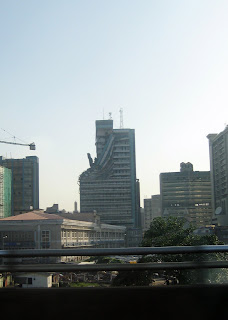In a conversation last week about the population of Lagos, I heard the same thing that I’ve heard and read before: “People come to Lagos from all over Nigeria to make a living,” my Nigerian co-worker said. “Some people come here and they work and work until they die. Some people come here and they work and work and they never make it. That’s the thing – Lagos is about the struggle to make it.”
An article published in 2006 in the New Yorker gives a similar assessment of Lagos:
Newcomers to the city are not greeted with the words “Welcome to Lagos.” They are told, “This is Lagos”—an ominous statement of fact. Olisa Izeobi, a worker in one of the sawmills along the lagoon, said, “We understand this as ‘Nobody will care for you, and you have to struggle to survive.’ ”
If this city is impressive for one reason, it is because everyone here is a hustler. On Thursday, when I had been in Lagos for two weeks, I paused to count how many beggars I had seen since my arrival. I could think of only four—four beggars in two weeks in the world’s sixth largest city—and each was physically handicapped. Had they not been in wheelchairs, they would have joined the street hustle like their counterparts, I’m sure.
The New Yorker article continues:
The hustle never stops in Lagos… at stoplights and on highways, crowds of boys as young as eight hawk everything from cell phones to fire extinguishers. Begging is rare. In many African cities, there is an oppressive atmosphere of people lying about in the middle of the day, of idleness sinking into despair. In Lagos, everyone is a striver.
And it’s not just the poorest of the poor who embody the hustle. I see it among the enterprising, emerging middle class every day at FATE Foundation, where I am working for the summer. FATE Foundation trains hundreds of young Nigerians how to start and grow their own businesses each year. The foundation is steadily expanding in Lagos and to other cities in Nigeria as well.
When I told a SIPA classmate that I would be returning to Lagos this summer, she told me her impression of the city: not that it is chaotic, but that it has a palpable urgency, a "kill or be killed" competitive spirit. On the street and at work, this is what I see every day.







